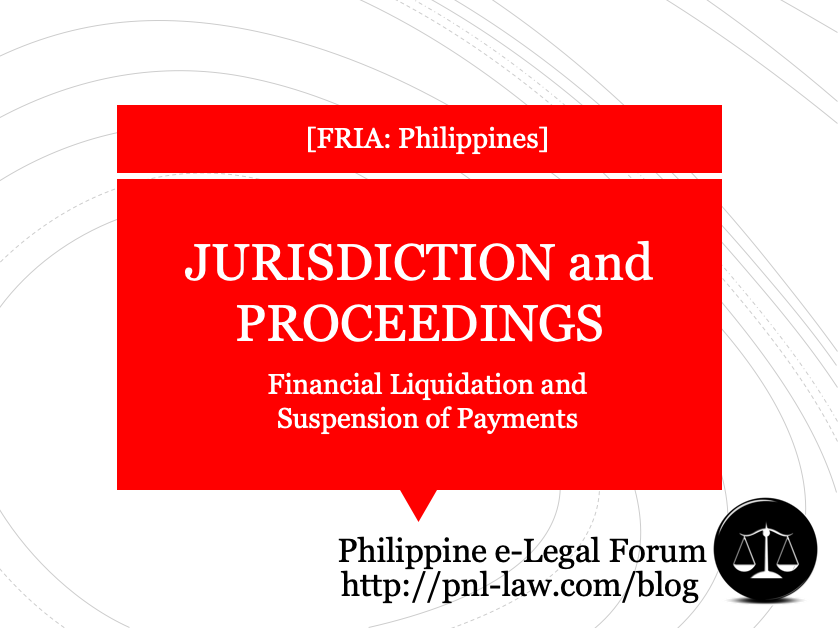Financial liquidation and suspension of payment proceedings are in rem, which means that it is binding on everyone and not just the parties who participated in the case. Financial liquidation covers both individual and juridical persons, as provided under the Financial Liquidation and Suspension of Payments Rules of Procedure for Insolvent Debtors (2105), also known as the “FLSP Rules”. The FLSP Rules, issued by the Supreme Court pursuant to Section 6 of Republic Act No. 10142, also covers suspension of payments for insolvent individual debtors.

JURISDICTION: WHERE FILED, HOW ACQUIRED
Under the FLSP Rules, the verified petition must be filed in the proper court. Jurisdiction over persons is acquired in the following manner:
A. The petition for voluntary liquidation of an insolvent juridical debtor must be filed in the Regional Trial Court which has jurisdiction over its principal office as specified in its articles of incorporation or partnership. Where the principal office of the corporation or partnership as registered with the Securities and Exchange Commission (SEC) is in Metro Manila, the petition must be filed in the Regional Trial Court of the city or municipality where the head office is located. [See Voluntary liquidation of Juridical Debtors]
B. The petition for voluntary liquidation of an insolvent individual debtor must be filed in the court having jurisdiction over the province or city where the debtor has resided for 6 months prior to the filing of the petition.
- In voluntary liquidation proceedings, jurisdiction over all persons affected by the proceedings is acquired upon publication of the Liquidation Order. [See voluntary proceedings for Individual Debtors and Juridical Debtors]
C. The petition for involuntary liquidation of an insolvent juridical debtor must be filed in the Regional Trial Court which has jurisdiction over the principal office of the debtor as specified in its articles of incorporation or partnership. Where the principal office of the corporation or partnership as registered with the SEC is in Metro Manila, the petition must be filed in the Regional Trial Court of the city or municipality where the head office is located
- In involuntary liquidation proceedings of juridical debtors, jurisdiction over all persons affected by the proceedings is acquired upon publication of the petition or motion. [See Liquidation of Insolvent Juridical Debtors]
D. The petition for involuntary liquidation of an individual debtor with the court of the province or city where the debtor resides. Note that the debtor need not be residing in the province or city for 6 months prior to the filing of the petition.
- In involuntary liquidation proceedings of individual debtors, jurisdiction over the person of the debtor is acquired upon service of summons; whereas jurisdiction over all other persons affected by the proceedings is acquired upon publication of the Liquidation Order. [See Involuntary liquidation of individual debtors]
E. The petition for suspension of payments of individual debtors must be filed in the court having jurisdiction over the province or city where he has resided for 6 months prior to the filing of the petition.
- In suspension of payments proceedings, jurisdiction over all persons affected by the proceedings is acquired upon publication of the Suspension of Payments Order. [See Suspension of payments for individual debtors]
PROHIBITED PLEADINGS
The proceedings shall be summary and non-adversarial in nature. The following pleadings are prohibited:
- (a) motion to dismiss;
- (b) motion for a bill of particulars;
- (c) petition for relief;
- (d) motion for extension;
- (e) motion for postponement and other motions of similar intent;
- (f) reply;
- (g) rejoinder;
- (h) intervention; and
- (i) any pleading or motion similar to, or of like effect as, any of the foregoing.
For stated and fully supported compelling reasons, the court may allow the filing of motions for extension or postponement, provided, the same shall be verified and under oath.
FORM OF PLEADINGS
Any pleading, motion, or other submission by any interested party shall be supported by verified statements that the affiant has read the submission and its factual allegations are true and correct of his personal knowledge or based on authentic records, and shall contain supporting annexes, which the submitting party shall attest as faithful reproductions of the originals.
An unverified submission shall be considered as not filed. An improperly verified submission may be considered as not filed, at the discretion of the judge. Upon motion, the court may order that the originals of the annexes to a submission be produced in court for examination or comparison by a party to the proceedings.
MANNER OF FILING
All pleadings or motions shall be filed simultaneously in 3 printed and 2 digitized copies in compact discs, flash drives, or other compatible Information and Communications Technology (ICT) media, in PDF format.
ORDERS OF THE COURT
The special commercial court may decide matters on the basis of the pleadings and other documentary evidence, and conduct clarificatory hearings when necessary.
Any order issued by the court is immediately executory.
The provisions of the FLSP Rules are liberally construed to promote a timely, fair, transparent, effective, and efficient liquidation and suspension of payments of debtors, in accordance with the declared policy of the Financial Rehabilitation and Insolvency Act (FRIA) of 2010.
- Extension of Filing Periods and Suspension of Hearings for March 29 to April 4, 2021: SC Administrative Circular No. 14-2021 (Full Text) - March 28, 2021
- ECQ Bubble for NCR, Bulacan, Cavite, Laguna and Rizal: Resolution No. 106-A (Full Text) - March 27, 2021
- Guidelines on the Administration of COVID-19 Vaccines in the Workplaces (Labor Advisory No. 3) - March 12, 2021
